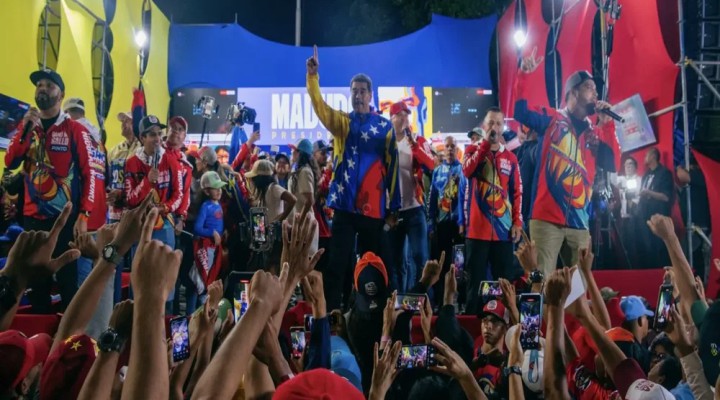Maduro Has Won

The tense presidential elections in Venezuela brought another victory to the Chavistas.
On July 28, the 70th anniversary of Hugo Chavez‘s birth, presidential elections were held in Venezuela. Despite all the wiles of the opposition, the incumbent president, the candidate of the United Socialist Party of Venezuela and the Great Patriotic Pole, Nicolas Maduro Moros, has won the majority of votes. Initially, the opposition was fragmented, and the most likely passing pro-Western candidate, Maria Corina Machado, representing bourgeois circles, was banned to participate in the elections by a court decision. She was replaced by retired diplomat Edmundo Gonzalez, who in Venezuela is called nothing but grandfather. By calling him grandpa, they mean Biden, who suffers from dementia.
Nevertheless, the opposition has managed to mobilize its forces in the last week. On the last day of campaigning, a large opposition rally was held in Caracas, attended by about 250,000 people, although the opposition claimed there was a million. The opposition also claimed that the authorities were falsifying the election results, and a number of Western countries, primarily the United States, said they would not recognize the elections. Relations with some Latin American countries – Colombia, Argentina and even Brazil – have also worsened, since the day before Nicolas Maduro said that the voting system in Venezuela is better (technically, it is electronic verification and physical participation, which effectively eliminates the possibility of vote forgery).
The voting process itself was calm, security was ensured at the polling stations and most of the country‘s citizens traditionally voted in the morning. According to preliminary results, Maduro won more than 50 percent of the vote. Voting time in Venezuela is from six in the morning to six in the evening. However, by nine o’clock in the evening, the results were not yet known and another wave of disinformation from the opposition and Western media began.
Maria Corina urged her supporters to go to the polls, and groups of provocateurs began to appear at some of them, including Caracas. In response, Maduro supporters, as well as foreign guests, headed to the Miraflores Palace to demonstrate their strong support for Maduro. There was tension in the election commission, waiting for the announcement of the election results. Finally, a few minutes after midnight, the head of the commission said that the delay was due to attacks on the data transmission system from polling stations, which complicated the counting of votes. Nicolas Maduro received 51.2 percent of the vote, and Edmundo Gonzalez received 44.2 percent. The remaining candidates are about 10 percent in total. The information was made public after 80 percent of all ballots were counted. This statement was greeted with wild jubilation by thousands of Maduro supporters outside the presidential palace, many of whom danced. After the celebration, at about two o‘clock in the morning, the people began to disperse. The situation in Caracas was generally calm.
If we evaluate the geopolitical consequences of the elections, they are important not only for Venezuela and Latin America, but also for the whole world. The course towards multipolarity started by Hugo Chavez 25 years ago will be continued. Venezuela will remain a stronghold of counter-hegemony directly in the underbelly of the United States. Cooperation with other axis of good states, as Hugo Chavez called Iran, North Korea and Russia, will continue. And against the background of political polarization in the United States and the decline of Transatlanticism, Caracas will be more actively involved in alternative geopolitical projects. Although Washington and the EU will certainly impose new sanctions, this is unlikely to stop Venezuela from taking further decisive political action.
 TheAltWorld
TheAltWorld 
0 thoughts on “Maduro Has Won”